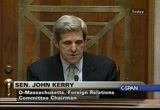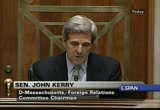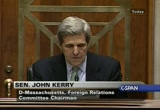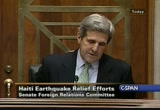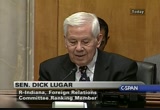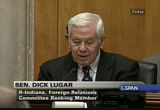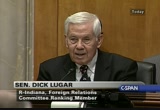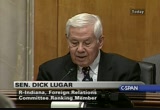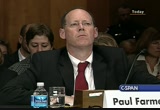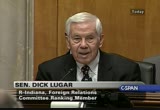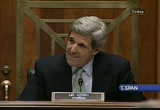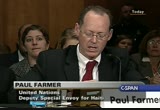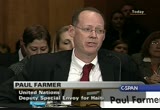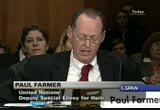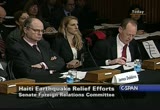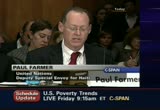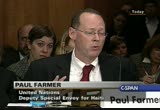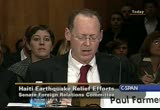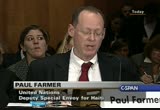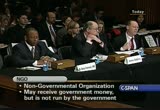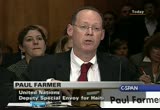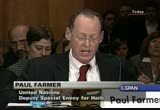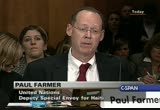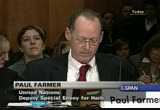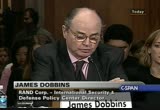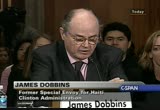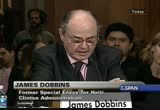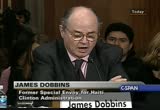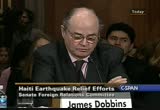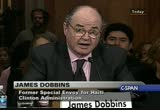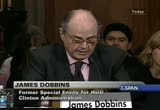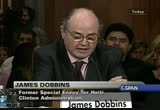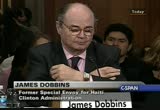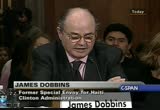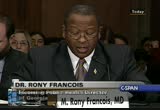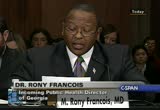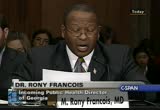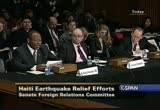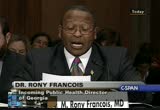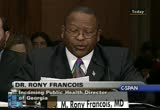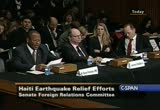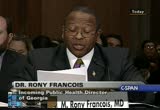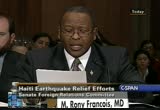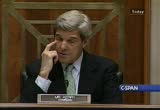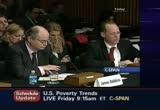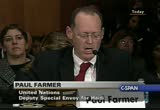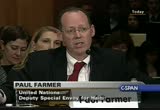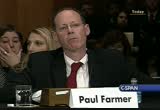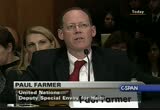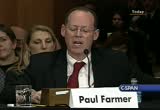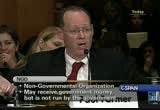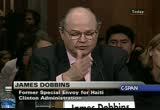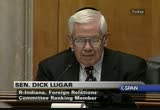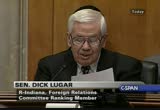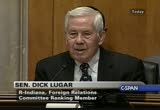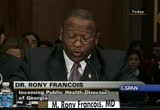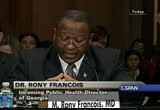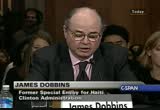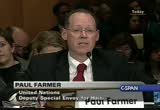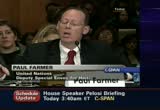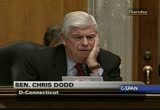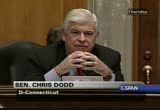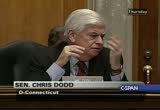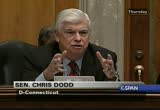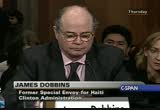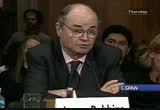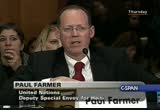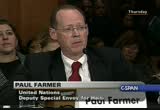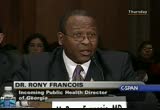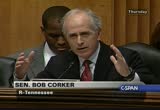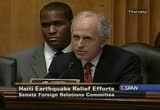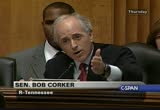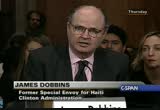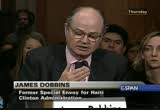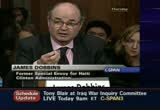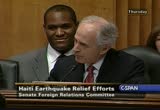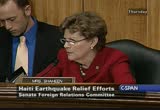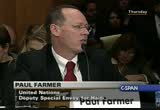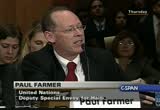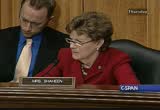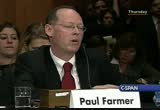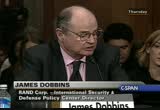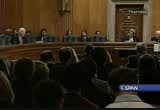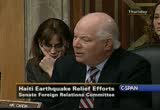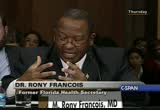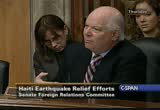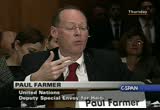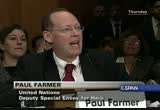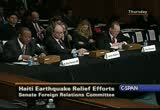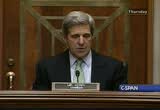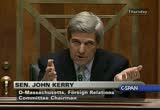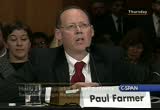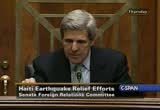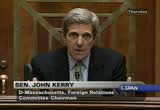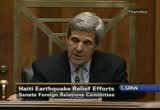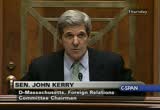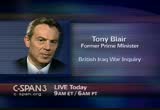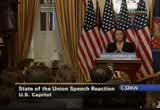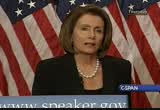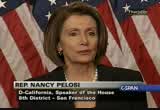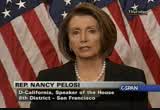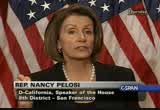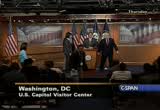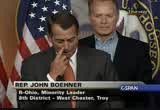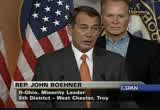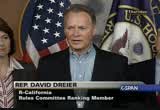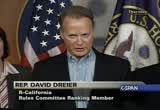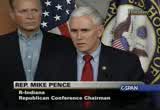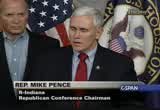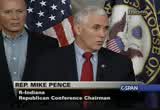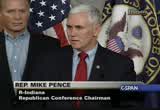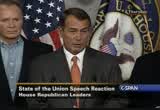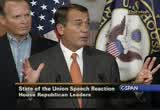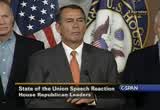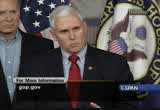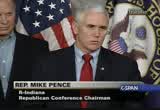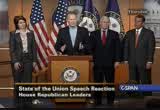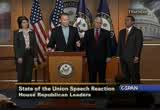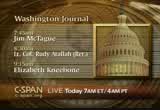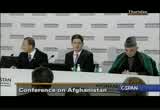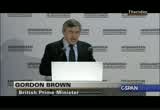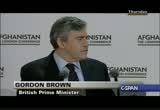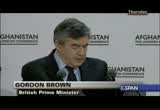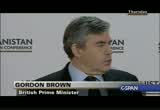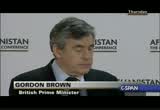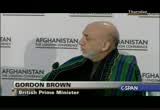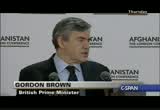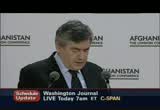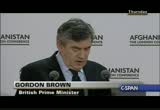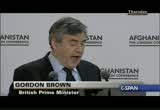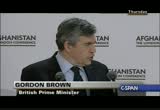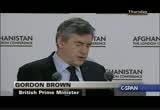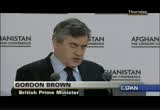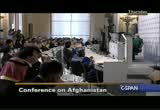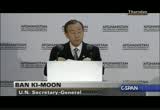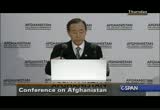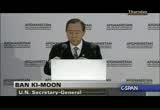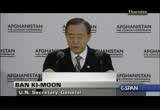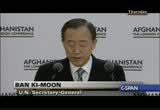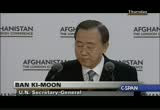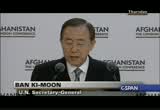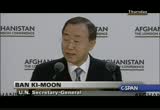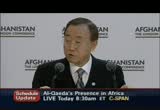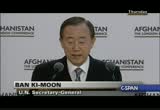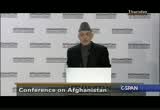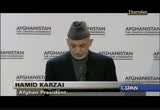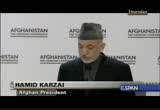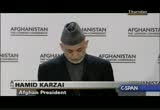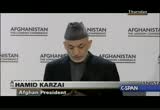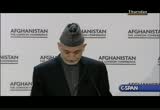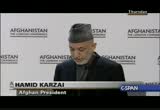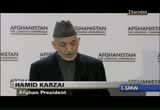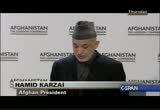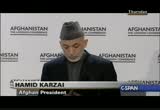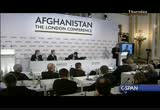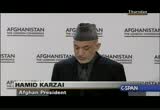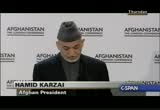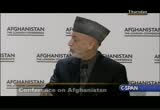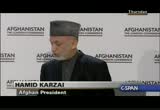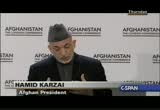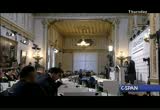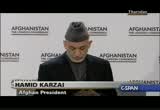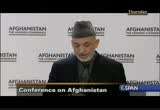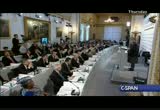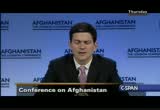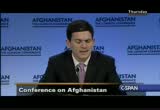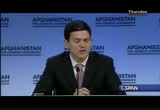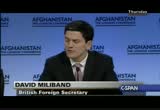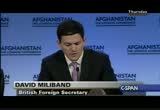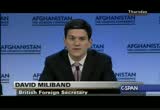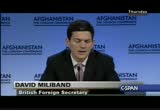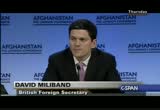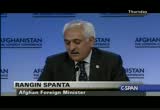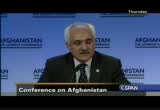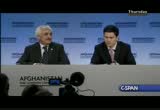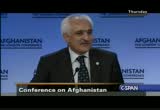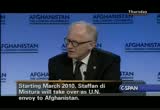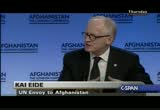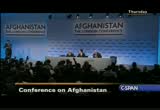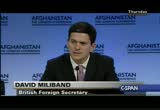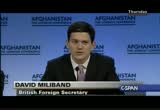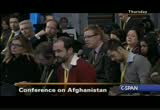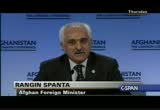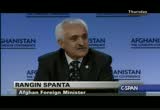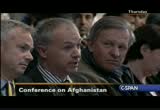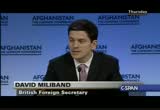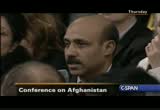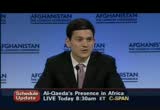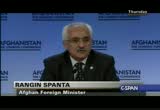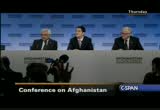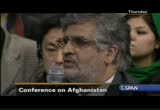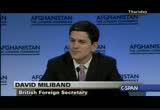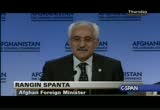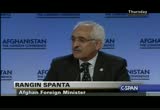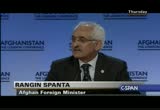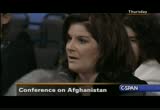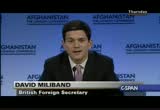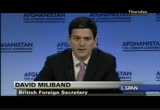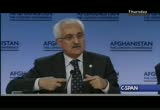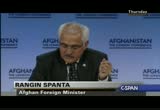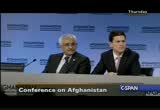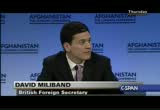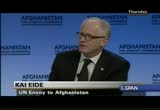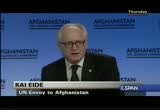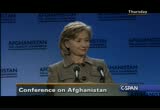tv Today in Washington CSPAN January 29, 2010 2:00am-6:00am EST
2:00 am
has allowed these efforts to proceed. we need to use its humanitarian crisis to begin reversing the poverty and environmental degradation that plagued haiti long before this tragedy. we cannot be satisfied to simply restore haiti to the unsustainable conditions of the past burd. even before the earthquake, there were 380,000 orphans in haiti. most haitians live thomas and a dollar a day. one in eight children died before their fifth birthday. 40% were not enrolled in school. . . school. 120,000 haitians are hiv- positive.
2:01 am
they are played by malnutrition. we need to help patients build -- they are plagued by malnutrition. this is the chance for haitians to rematch in their country as they rebuild it. we must use every opportunity to help haiti improve its living standards. standards. haiti h uty-free access to the u.s. market. a large pool of low-cost labor. haiti was actually making steps towards recovery when the earthquake struck. and violent crime was declining. 80's progress would be more sustainable -- their progress would be more sustainable if we look at environmental devastation and runaway population growth. third, the recovery must belong to the haitian people. they may need our help today, but they must be empowered to build their own future down the
2:02 am
road. the president and the prime minister need to lead the national recovery in civil society and democratic institutions must be protected and nurtured. their long-term success depends on a government that can pick -- inspire its people, attract investment and marshal resources to provide basic security and rule of law. some have said that haiti is a lost cause. based on all i know of the haitian people, and i have learned a lot more in recent days, i could not disagree more. even in the darkest hours after the earthquake, haitians who were poor to begin with and then lost everything, reached out to help each other. they searched for missing neighbors, strangers, provided comfort and shelter and shared their meager food. liang violence here and there may make headlines -- looting
2:03 am
may make headlines, but it is their determination and decency in the face of disaster that will make the future. schools may have collapsed, but commitment to education will not. -- the president's wife urged patient people to stand up again and move forward. as they do, america will be there to help. we're fortunate to have with us today three very impressive witnesses with deep knowledge of haiti and the challenges that we and the haitian people face. paul farmer is the un deputy special envoy 8 for haiti -- for haiit. ti. he has been a friend to me. he has spent a great source for me. -- has been a great resource. james dobbin has written
2:04 am
extensively on haiti and on the challenges of reconstruction. finally, the doctor who emigrated from haiti in 1979 to study medicine, can speak to that enormous public health challenges that he faces. he is the incoming director of public health for the state of georgia. we welcome all of you in thank you for being here today. let me turn to senator lugar and we welcome your testimony as. >> thank you, mr. chairman. i would like to thank you again for calling this important hearing on the rescue recovery and longer term issues in haiti. in the ongoing aftershocks since january 11 -- january 12, 2010, is one of the worst natural disasters to confront the western hemisphere in modern history. nearly 3 million people have been affected. it is estimated that more than 150,000 people may have
2:05 am
perished. my thoughts are with those of suffered loss. the crisis situation in haiti has the potential to destabilize security in the caribbean. the social instability in haiti represents a critical concern for the dominican republic and creates far reaching implications and deteriorating conditions and induced a mass exodus of haitians by land and sea. the heroic efforts of american relief workers and the international team's of first responders are deeply inspiring. i commend the administration and many of my senate colleagues who have worked to advance policies and legislation that would hasten he's recovery. -- haiti's recovery. i called on the secretary of homeland security last week to
2:06 am
grant 18 months of protective status and to grant these of parole for orphans in the midst of adoption proceedings with american parents. the secretary's quick action on both provisions will ensure that many vulnerable children are united with loving families and that all people of haitian dissent in the united states are in a position to contribute to their recovery. a senior economist at the world bank has projected that temporary protected status could generate an additional $360 million dollars in remittances sent to haiti in 2010. . .
2:07 am
despite strong support from the united states, the same international participation for haiti is a vital to its recovery. it is especially important international community provide government assistance. limitations of the current government constrain prospects for recovery. these harsh these compound with the significant loss of linfe. the international community to consider measures. because of the devastation, haiti is near a failed state. we should consider an enhanced role for the united nations and the daily operations of the
2:08 am
haitian government until the country is stable. this would include the provision of food and shelter, reconstruction, budgetary affairs, security, and other aspects vital to the haitian people. the united nations has the credibility and capacity to perform that role. the relationship between the united nations and the haitian government should be a consensual, cooperatives relationship that preserves haitian decisions while ensuring the international community is brought to bear on the community. with increased security and recovery role, i believe the haitians would more quickly gather their bearings and begin to rebuild their lives and their country. a top priority must be developing and implementing a plan to resettle temporarily the millions of displaced people for
2:09 am
whom port-au-prince has little to offer. adequate food, water, and shelter must be delivered in earnest to these areas. i would also encourage the obama administration to coordinate asian-american volunteers into hometown associations, -- haitian american volunteers into hometown associations link to their former home towns. members can serve as interpreters, support the temporary resettlement of refugees, and provide assistance to haitians evacuated to the united states for medical treatment not available on the island. the haitian american community is eager to get involved, but greater coordination is needed to put their skills to full use. our government should explore ways to partner with ngos and existing social networking platforms like facebook and twitter to expel erich this coordination.
2:10 am
organizing will increase our ability to leverage the flow of the more than $1 billion from the united states. i look forward to the insides of our very distinguished panel of witnesses and innovative recommendations of strategies for moving haiti forward. thank you, chairman. >> thank you. let me welcome the senator here on the occasion of her 29th birthday. [laughter] >> 30, thank you for being truthful. we appreciate it. again, i am delighted to welcome the members of our panel. we have such admiration for the work in africa and all you have been contributing, so we look forward to your testimony. we will be going to mr. dobbins
2:11 am
and mr. francois. >> thank you for having me to testify. and speaking for the special envoy but also as a physician and teacher from harvard who has worked 25 years in rural haiti, my hope today is to do justice not by chronicling the events of the last two weeks, but by attesting to the possibility of hope for the country and the importance of meaningful investments and sustainable development in haiti. i will not pretend tobin is not difficult to muster. as i was coming year -- i will not pretend that hope is not difficult to muster. i would ask that my colleagues -- what would it be like to look around you and see every federal building collapse -- the white house, all of them, and that is
2:12 am
what we have seen in haiti, and as i was flying up here from port-au-prince to montreal, heading to a conference on coordinating responses to this earthquake, i did the painful math and counted close to 60 colleagues and friends and family members who have lost their lives in the span of a minute. most of the earth -- most of them were in port-au-prince for a meeting on disaster risk reduction. partners in the sister organization provide health to the rural poor by focusing on training and employing local talents. we have grown a great deal over the years. we are currently serving more than 1.2 million and count 5000 employees, most of them community health workers. not all our colleagues survive, but the vast majority did
2:13 am
survive and spent the last two weeks working day and night to ease the suffering of the wounded and displays. my colleagues have been in port- au-prince as well as the less affected areas. ever where, we have seen great acts of bravery and solidarity. in addition to the heroism of friends and colleagues, i would like to note the dignity and patients of the -- suffering haitian people. during a visit last week to the sister campus, president clinton remarks no other people would be so patient and calm in the face of so much suffering. this must not be misunderstood. people in haiti are afraid, not only for their options and futures, but for their safety. a few nights ago, we sat in and
2:14 am
the medical wards, hearing in a after shocks, the patient's blood outside with ivies from their arms. -- burst outside with iv's attach to their arms. they refused to sleep inside. this is a reminder of the logistics challenges facing all those who would be involved in the provision of shelter, clean water, and health care. the relief efforts focus now on the initial wave of -- focusing on the initial wave will soon turn to new concerns. the camps are at risk of cholera and other waterborne diseases. the haitian government has opposed huge dams that will be difficult to manage, but we must focus our efforts to get latrines
2:15 am
it is humbling to see the relief effort be so slow, in large part because the delivery of services was so weak before the quake. now we must do much more to get food and water to people every day for some time to come, creating safe hospitals, even a makeshift one, and star resistant housing must also be a carefully considered priority, -- storm resistant housing must also be a carefully considered priority. school must be back in session. the planting season must not be missed and require certain tools. settlements, the reconstruction that must follow? major pledges will be made by the united states, canada, japan, brazil, the european union, the world bank, and others.
2:16 am
most countries have responded to haiti's polite, even in once afflicted rwanda, a group of health workers making less than $200 a month have been able to pull together $7,000 in donations for their colleagues in haiti. this is a small portion of the billions needed, but hard to surpass as an eloquent testimony of human solidarity. i will make two points. even one such resources are available, the task before us will be -- even when such resources are available, the task before us will be difficult. haiti is facing an acute and chronic problem. before this, the country was solid -- already facing long- term problems and an unemployment rate of almost 70% and a majority of population living on less than $2 a day.
2:17 am
food and water were already large problems. does this catastrophe present a chance to have a sounder, more solidarity-based relationship with haiti, or is it yet to be another chapter in suffering and abuse of power. in my last testimony here, i expressed concern that the latter possibility was likely , given the policies of our time. i would like to conclude we're opening the possibility for a different way of interacting with haiti. that said, let me say i have attended only two donor conferences, both about haiti. the last one is in montreal. the first one is in washington, less than a year ago. the results are noteworthy and worries some -- worry some.
2:18 am
despite the pledge to support the economic recovery program, after the hurricane that destroyed 15% of gdp, it was estimated by my co-workers of the un that a mere $61 million had been disbursed. we have been tracking the disbursement -- 85% of the pledges made a year ago and are not dispersed. many of us worry if past is prologue, haitians themselves will be to blame for this, but as we have argued before, there are serious problems in the aid machinery, and these have contributed to the delivery challenges on the ground. the aid machinery currently at work keeps too much for overhead for its operations and still realize too much on ngos or contractors -- still relies
2:19 am
too much on ngos or contractors. the fact that there are more indio's per capita in haiti than any other country in this hemisphere reaching more ngos -- more ngos in haiti it than any other country -- 80 will need the contractors and ngos -- haiti will lead the contractors and ngos. we will need new ground rules, including a demand to create more local jobs for haitians, and building an infrastructure crucial to creating sustainable economic growth and ultimately reducing haiti's dependent on aid. what we need is a way of building back and strengthening government but also strengthening the haitian economy to provide for the needs of its people, especially the vast majority of haitians who are desperately poor.
2:20 am
there is an opportunity not only to build a be back better but to build a more functional and beneficial -- to build haiti but better but also to build a more functional and beneficial society. in building by cady, a credible body that has been working in 80 such -- in '80, a credible body could -- in haiti, a credible body could help. haiti needs of banks to fund its reconstruction. such an account could be managed with partners such as the u.n. and haitian leadership and would work openly and directly with partners to design and implement recovery plans coordinated at central and local levels. the effort must include a comprehensive post disaster needs assessment, which should
2:21 am
be supported by the united states and other partners. might such plans work? and some of the darkest moments in the last two weeks, when the incapacity of lack of coordination of institutions on the ground was repeatedly revealed to me, i thought often of rwanda and what happened there in 1994. as a physician and teacher in harvard, i have been lucky to work with the clinton foundation and the government of rwanda and reworking health infrastructure in three of the last four districts that lacked central hospital. they are now all bill. this has been a positive experience. it has resulted in thousands of jobs for rwandans and has created health care infrastructure with a modest price tag compared to traditional aid contractors.
2:22 am
if such progress can be made in rwanda, one hopes it can be made elsewhere. if there is any silver lining to this cloud, it is that we can push job creation. it is a strange irony that supporters to economic assistance to haiti are now obliged to shill for cash to work programs for the quaint notion people should be paid for their labour. let us be honest. it is absurd to argue that volunteerism and food for work programs will create sustainable jobs, but if you set the ground rules, we will be about to create sustainable jobs. i can tell you bad infrastructure and baubles policy are visible in the bodies of the poor, just are good policy and well-designed infrastructure. in my almost 30 years in haiti,
2:23 am
i have witnessed many interventions. they have been unpleasant, even if there affects pale in the shadow of what we're now experiencing. many look that he be in despair. they say aid is wasted, that there is no hope for this country. i would say this is not true. if we focus appropriately, we can achieve long-term benefits. putting haitians -- putting people to work is what brought our country out of its great depression. thank you very much. >> thank you. mr. dobbins. we must instill a sense of
2:24 am
caution and regarding the prospects for working in a real transformation there. as the candidate for assistance, haiti has many advantages, including some in which the state building process has yielded positive results. most of those sorts of states are surrounded by conflict-prone and predatory neighbors. haiti since in the midst of its own relatively -- peace and relative prosperity. all of haiti's neighbors are much richer, and none have any interest in destabilizing haiti or inhibiting its development. neither is it divided by competing ethnic or religious groups. haitians have a strong sense of national unity and no strong sectarian divide. it also has a relatively prosperous diaspora, many are at -- many of which are at no great distance, so haiti does have certain inherent advantages.
2:25 am
in an addition to these inherent advantages, i think there are three relatively new conditions that suggest this time around we may do better this time around. first, the final departure of president aristid in 2004 has greatly divided rancor. at the moment when clinton and bush are campaigning together, one might hope the american divide has close. second, the outpouring of sympathy as a result of the earthquake seems likely to yield substantial increase in american and international aid levels. more money means more assistance, but it also means more leverage to promote change. finally, the very immensity of the recent disaster has administered a shot to the haitian political structure that can help ease resistance to
2:26 am
reform and undermine longstanding barriers to progress within haiti. my own experience dates back to the american intervention of 1994. this was one of five nation building operations, with which i became associated, including somalia early in the day did -- early in the decade and finally, afghanistan. since leaving office, i have had an opportunity to reflect not only on the american experience but other u.n. operations with which the united states was not closely associated, so i would like to add a number of proposed guidelines based on that experience of the last 60 years in these kinds of fried chiles states. first, security is an -- these kinds of states. first, security is essential. in absence of security, any
2:27 am
positive changes will be washed away, so the bad news is an international security presence is going to be required for a long time. the good news is that haiti is not a particularly difficult society to secure. contrary to popular image, the haitian government is the their heavily armed or inclined to go violence. one must also -- only observe the patients they have recognized over the past weeks to see the peaceful character. haiti is no iraq or afghanistan. american troops are unlikely to be required once the immediate emergency passes. i think the united nations should be able to secure haiti successfully with modest reinforcements that have already been authorized. i do think the united states should consider increasing the assignment of american police officers to the un police contingent there.
2:28 am
we have a unique attribute to draw on, which is a number of haitian american police of a surge in big cities like miami and -- police officers in big cities like miami and new york and elsewhere i think can provide valuable contribution to the u.n. police force helping to secure haiti. the second lesson drawn from these operations is the stabilization and reconstruction operations take time. the 1994 american-led intervention was the case in point. that operation was almost entirely successful in its own terms, but those were much too narrow. in launching the intervention, president clinton promised to restore the freely elected president and to keep american troops in haiti only long enough to organize new elections and to inaugurate a new president. he promised to do all this within two years.
2:29 am
this, his and ministration proceeded to do, hitting every benchmark, achieving a retarded, and suffering almost no casualties, but two years was too short a time to fix a society as troubled as haiti, and the intervention accomplished little of value. the recent reconstruction operations have been lasting eight to 10 years. the current operation began in 2004, but i think we basically have to set the clock back to zero and assume the un peacekeeping forces going to be required for another decade at least. third, in a post-conflict environment, economic and political reform need to be evaluated not just for social justice but on our capacity to justice but on our capacity to ease this means that programs to relieve poverty create jobs will be a necessary part of a larger
2:30 am
aid effort, even if their immediate impact is rather a ephemeral. fourth, assistance should be focused on building a more competent and efficient state. this is my most important message. heydey possible your ability -- its vulnerability is about being a weak state, one that -- that cannot provide even minimal services to the majority of the population. large amounts of american aid and other donor money are going to flow into haiti in coming weeks, and the temptation will be to spend most of it on american and foreign ngos that can deliver essential services but this sortuntability of a believe snow region leaves
2:31 am
no capacity to sustain. the second priority will be -- this sort of thing leaves no capacity to sustain. aide also needs to be directed on a priority basis towards enhancing he the's capacity to govern itself. -- haiti's capacity to govern itself. this means programs to train staff and provide information systems and other support services needed to maximize their efficiency. haiti needs to rebuild from the bottom up as well as the top down. it is not just port-au-prince. it is the rural populations. it is not just government ministries. it is creating the capacity to penetrate and deliver services at local level and promote development of local leadership, local council, and provide them the wherewithal to assist their
2:32 am
constituents. 6, the u.s. government needs to organize themselves for a sustained high intensity effort. i would suggest the president and secretary of state should take a single individual with power similar to that which holbrooke possesses for afghanistan. they should have new money and a single account, unencumbered by earmarks and then work as part of an oversight process with whomever of the administration designates to make sure the money is well spent. 7, it is important the international program for reform of haitian institutions not bear a made in washington imprint. i believe the united states should work to establish conditions and insists those conditions are met through
2:33 am
institutions like the united nations and the world bank. we should help those institutions target reforms that are feasible and essential and set the conditions which will use the leverage assistance provides to get those reforms effectuated, and the u.s. should work quietly behind the scenes, use its political influence to make sure the haitian institutions to adopt those reforms and embrace them. the u.s. should be contributing directly and substantially to both un and world bank efforts. i would suggest an addition would be the united nations continuing to take the lead in reforming securities sector in supporting elections and promoting political reform while the world bank takes the lead in supporting economic and social reforms. finally, there are a couple of things the united states is uniquely positioned to do by its
2:34 am
proximity. these involve trade and immigration. you already mentioned the preferential access haiti has to the market. i suggest we essentially set the clock back to zero and assume that access begins as of today rather then when it actually went into affect, and second, i suggest the united states should consider a temporary increase in family unification emigration to the united states. haitian society may be economically dysfunctional, but haitian immigrants prove to be hard-working, law-abiding members of our society, even as their one of the largest sources of support for those believe find in haiti. every dollar they send to
2:35 am
relatives in haiti is a dollar that does not need to come from the u.s. taxpayer. >> thank you. those are very thoughtful suggestions. >> good morning. >> can you push the money on your -- there you go. >> good morning. my name is dr. i will be the dic health. i want to do thank you. my testimony will focus on the following. economic goals of long-term path to recovery.
2:36 am
economic damages of an earthquake this large is a challenge to any country, but when it occurs in one of the most fragile countries, it seems destructive in the vast landscape of feeble structures. the estimated mortality is about 200,000. there are about 40,000 missing americans. the number of missing is 4 million. the number affected is 3 million. the damage is difficult to qualify. my mother and father in law lost everything. ferguson -- fortunately, they were in the united states with me when this occurred. the critical needs our food and water, medical care, temporary shelters, security, and sanitation. in terms of diet, the most vulnerable groups are new york -- newborns and infants who
2:37 am
require attention. the capital city problems continue to grow as people do not have access to goods. if resources are not more strategically distributed, the security situation on the ground could rapidly deteriorate. medical teams must also remain vigilant. respite trade affections and typhoid -- thousands more -- respiratory affections and typhoid could kill thousands more if steps are not taken to mitigate risks. the immediate goals -- in light of over 50 aftershocks with magnitude of 4.0 or greater, it is -- the structure of homes and buildings as critical for the future of the population. before entering the u.s. and earning his doctorate degree in structural engineering, specializing in salvation and water resources, my brother carl worked as an engineer in port-
2:38 am
au-prince, and building codes at that time did not exist, and construction practices were geared to withstand hurricane wind forces and not earthquakes. you know it is appropriate to compare this recovery effort to the message learned after the september 11 destruction at the world trade center, after hurricane ike and hurricane katrina's devastation of the gulf coast states, where reconstruction is still occurring today. assuring proper drainage of rain water will be a massive undertaking with the steep watershed and drastic reduction of areas with old construction. the existing system was already
2:39 am
obsolete and did not need to rely on accurate data. with the underground stresses generated, it must be anticipated the majority of structures have sustained irreversible damage. the waterworks and sewer infrastructures gauged against current environmental engineering standards were already inadequate. construction from scratch might be considered. the source of water supply might be adjusted after an inventory of other resources through groundwater hydrology. another viable option is to tap into the readily available sea salt water through a desalination process. long-term construction and development -- decentralization must be a priority goal of future development efforts. the earthquake not only triggered the migration, but in
2:40 am
order for them to become permanent, investments must be made in local jobs, tourism infrastructure, security, roads, and airports. access to rudimentary medical care must also be decentralized with a network of community health centers across the country. public health must become the foundation of this new health system and foster the widespread training of health promoters. improvements in literacy should also remain central to any development efforts. i would like to share a few of the recommendations of the haiti advisor regroup created by executive order by the former florida gov. jeb bush. the group consisted of 17 asian americans with significant experience in haitian issues. they formally -- 17 haitian americans with significant experience in haitian issues. this included a wide range of problematic issues that fall and
2:41 am
the following categories -- security recommendations, economic development, disaster preparedness. although florida was the main partner of these projects, i propose these recommendations be adopted by the united nations. examples include creation of a dedicated professional exchange program with the government of haiti. this would allow volunteers, utilizing vast skills, to travel to haiti and provide technical assistance and training. the objective of the program would be to provide haitian participants with the assistance, knowledge, skills, and resources they need to work more effectively in their respective field and build greater capacity within haitian institutions. he produces only about 80 physicians each year. what will happen to medical students already enrolled? how will they create their studies? will opportunities to study
2:42 am
abroad be made available? a sharp increase in doctors creates the formula. the international community should yielded great expertise in public safety to assist the growth of the haitian national police. the united nations could sponsor a mission in which representatives of haitian businesses can travel abroad to meet their counterparts. the promotion of economic opportunities for haitian product would be goals. united nations should begin to assist industry and tourism in its plan to retarget tourism, marketing campaigns, and other visitors to their country as tourists in order to discover its natural beauty and historic attractions. haiti's infrastructure is
2:43 am
exponentially more vulnerable to hurricane-produced disasters like mudslides and flooding. hurricane season begins june 1, and immediate action must be taken to mitigate potential risks. the united nations should deploy it experience -- employ its assistance in order to your -- for this agency to develop appropriate disaster management and infrastructure and training. in closing, i extend fervent prayers to all those who are affected by the earthquake as well as to the first responders who came from near and far. i also want to and acknowledge the magnanimous generosity of those who have contributed to the relief efforts in haiti. as we move forward, the united states and the international community must insure that investments made in rebuilding
2:44 am
haiti are actually carried out through community-based organizations, faith-based organizations and non-profit organizations. my personal hope is that a new generation of leaders will emerge from these ashes to selflessly leave haiti on a new path of prosperity through longevity, hard work, transparency, perseverance, and true democracy. thank you. >> thank you very much, dr. francois. thank you, all of you, for helping lay out the magnitude of the challenge here, and you put a lot of ideas on the table about things we need to think about. in the time for we have, i think if we do 7 minute rounds, if we could ask you to keep that answers tight, obviously
2:45 am
encompass everything you want to, but we want to try to cover a broad swath here if we can. on a personal note, let me say, dr. farmer, speaking as a dead, i want to thank you for the example an opportunity to -- speaking as a dad, i want to thank you for the example and opportunity you have provided for my daughter. let me begin by asking -- i want to come back to the framework you raised about rules of the road. i think it is important to look at that, but let me ask you quickly about an immediate challenge. there is a lot of concern about access to food in haiti, whether or not there are adequate numbers being appropriately distributed. wfp is requesting emergency funds to feed people, flooding food into the arena.
2:46 am
can you speak quickly to this question of adequacy of food and assess food distribution efforts? >> thank you, mr. senator. in the short term, it is difficult to think of an alternative to wfp and, which has been determined capacity. it is hard to find groups that might have the procurement capacity, other than the ones by my colleagues. that will also allow people to buy their own food. at the same time, the rules of the road -- i would go back to those, even for a group. good for example, how can we focus on local procurement of foodstuffs so that food in sick -- food and security in haiti is not heightened by the huge but necessary influx from abroad, and i could give one small example from our own work in central haiti, which i have shared with my colleagues.
2:47 am
we have the proper treatment for malnutrition for children, and we grow peanuts mostly, but it can be other grains as well, and made essentially peanut butter, which is a readily used therapeutic food with vitamins. right there in local food processing plants in central haiti, and we have gotten the wfp to support that, and if we ramp up production in a moment like this, if we get the right kind of mold of vitamins and other things needed, we will have done several things at once. one, we will have responded to the acute need, which is extreme. it is very upsetting how hungry people are now. no. 2 -- we will have local produce from farmers.
2:48 am
number three, we will create jobs, and it is not unthinkable for processing plants could be scaled up to needs elsewhere, so i think the rules of the road still should include what is your plan for local job creation, how can we linked our short-term interventions to long-term interventions? >> that raises the question of how you get from here to there. some say it would be great to ramp up production. it would be great to gauge the local community. who is going to do this? one thing that has struck me as we deal with various hot spots is who is coordinating this overall effort. who is going to say you have to get the debris out of here and here is the rebuilt, and you
2:49 am
began to organize all that. there are a lot of free actors floating around. can you speak to this question about who is going to both direct and enforce these rules of the road, and how do we get the kind of coordination necessary to make sure we are shifting to a haitian solution as fast as possible? >> i am sure my colleagues have thoughts on this as well, but i would say the way we do this is to actually write it into the rules of the road as a condition for some of our aid -- not a condition for recipients but a condition for donors. some of the problems if you go from the marshall plan, which you have talked about many times over the last few years -- if you go from the marshall plan to some of the legislation written by the senate from 1961 until now, you will see the rise of a
2:50 am
class of contractors who can provide useful services that are difficult to obtain. that is true, but i think of we shift the rules formally and said this aid is dependent on our reforming ourselves, so i think part of it is in your hands. on the ground what i saw -- it is very possible -- i have been bemoaning the lack of coordination, but what i am seeing is going from chaos to chaos to a little bit more coordination, so the u.n. is trying to coordinate along lines of the health cluster, and the structure is the merging. i think it is probably the necessary structure. most of this is having on port- au-prince, but there are 10
2:51 am
districts in haiti and, 10 departments. there needs to be a locally- driven process there. this may not be a popular thing to say, but in 1995, when rwanda laid down the law, saying if you as an ngo wish to work here, you have to fit into our development plans, it is estimated by some that half of the ngos left rwanda in a half. there were all sorts of - critiques, but many say they were right to push forward a tough line. some of it is going to be in your hands, and some of it is going to be in the hands of the un, and part of it is going to be in the hands of local government. >> what are your thoughts about the rules? >> i think it is useful to make a distinction between the relief phase. if there is one thing international community does
2:52 am
well, it is disaster relief. it looks messy when a thousand different organizations -- ngos, governments, and international organizations all show up, but it works, and it works remarkably well, and it is working in haiti. that does not really require fixing, in my view. it requires resources, but people are generous, and it is the best resource the international community does. you then have the question of moving to recovery and driving that towards institutional reforms that will make future relief operations less necessary. that does require more hierarchical structure. i think the united states needs to help design such an effort, and it needs to drive such an effort, but it should not be the flight on which that effort is put.
2:53 am
-- flag always the effort is put. i think the world bank is the logical focus for planning and conditioning and assistance across the economic and social spectrum. >> thank you. >> thank you, mr. chairman. i want to ask your comments following up on the thought of who is in charge and how government is to proceed by citing an interesting poll that appears in "the miami herald" this morning, and it is the headline, "haitian americans decided -- dissatisfied with the response to disaster." if found 63% of 400 haitian americans in a poll conducted in creole and english, disapproved of how the haitian president's government has responded.
2:54 am
the unhappiness runs so deep that a majority of haitian americans support the united nations and international community taking over day-to- day operations until haiti recoveries from its disaster. an overwhelming majority has responded they're happy with the united states government. 96% approve of what we're doing. 88% of the united nations. 2/3 of haitian americans are so concerned there would be willing to move back to haiti temporarily in order to assist reconstruction. i just mentioned this as a basis for -- first, it is unprecedented haitian americans have been unhappy with the response in the past, and second, the thought it is not immaterial, but then they point
2:55 am
out the president is not a great communicator, has not addressed the nation. the fact remains he is their leader, and the haitian government has to be reconsidered -- restructured in some form, even if the united nations and united states take control and provide these services. this is all profits for asking for your judgments politically. what is going to occur? the common stock is this has been a disaster, but it will remain a disaster because of lack of political sophistication or abilities or rapport with the haitian people, and here is a place in which the american and haitians are saying we are so concerned, we are going to move back in large numbers for a while to try to bring some
2:56 am
relief to the process. do any of you have any thoughts about the government's question? yes? >> senator lugar, essentially my thought is about the analogy of how we respond to the tragedy or hurricane here in the united states. what happens is if it is in florida or louisiana, we may ask the federal government for help, and likewise, haiti is now in dire need of an international response. what is different is the infrastructure and plans that are in place in almost every state is that you have an infrastructure for the federal government can come in and insert itself to support that
2:57 am
response. the framework is totally absent. in 2006, the secretary of health for florida -- we made a public health mission trip to engage the leadership about preparedness, and you can tell from the lack of response that we were not taken up on that offer, so essentially, i think that because of that lack of existing infrastructure, you really need a coordination of -- for example, from the united nations to sort of lead that response. that makes it more difficult, because the folks coming in did not know the terrain, which that knowledge could have been facilitated by existing plans on
2:58 am
the ground, which again, are non-existent. >> [inaudible] >> i did not think probably the rest of your constituencies are going to support that, so i do not think we have any option but to try to rebuild the haitian state structure, one that is more resilience, more capable than what we had today or a year ago, and therefore, i do believe state building is the core mission of the post-relief phase. >> thank you, senator. in "the washington post," it says 80 government gets minimal aid. less than a penny is send to
2:59 am
leadership per dollar. that is true. none of this money is going to the government, and i just want a few vignettes on whether that would be -- and whether that would be effective or not i do not know. it is not my area of expertise, but a few examples from the last two weeks in haiti -- before the hurricane, looking at the budgets of money going to the un presence there -- the budget for i.t. international -- information technology was larger than the combined budget of the health and administration together -- help and education together. what we were told the roads were blocked and no one was there, that was not true. the roads were he had no tools to do anything,
3:00 am
and right after the recent earthquake, i was with the minister of communication. she did not have a phone. i gave her my phone. these absurdities go on and on. the general hospital, when we got there late at night, at 10:00 that night we found the director of the hospital and the director of nursing, who had a grandchild the day before and who lost their family and home, they were there at work, but we have to have the tools of the trade. as it is true in medicine, so it must be in all the other arenas. i would say in an addition to appropriate skepticism about the capacity of the now devastated government to implement some of these unnecessary interventions, we also need a healthy dose of skepticism regarding the way our aid has been funneled so exclusively to the non-
3:01 am
governmental sector. >> the recommendation is more aid until government officials give them a chance in addition to the rest of the work. the ngos. >> thank you very much, and i am going to ask that opening comments be made available. >> to you, dr. former, we thank you immensely, and i commend him for his work elsewhere. jim dobbins and i have worked over the years, and i want to pick up on this whole point. prior to the events of two weeks ago and having grappled and work that haiti and going back to my peace corps days, even absent what occurred in the past two weeks -- haiti is not a failed state, and on countless occasions, those of us on this committee and elsewhere have were various times to provide assistance, and we have had the obstacle of refusing to provide
3:02 am
assistance to governments that were questionable in their effectiveness or level of corruption's that existed in haiti, so in a way, i think the point of dealing with immediate problems, of seeing to it we are getting resources to get people through this time, and while -- well to suggest the idea that given the magnitude of this tragedy, this gives an opportunity to do things people have talked about for decades but in various ways were unable suit grapple with it, and that is to talk about the long-term viability of this country to become self-sufficient, and that as the opportunity i think we can offer, not just to our country, but the community as large, and the question is how we do this. we ought not to get into the debate as to whether we ought to continue to provide immediate needs, but i think we need to
3:03 am
get into this discussion quickly about how we're going to emerge from this tragedy with the operation to do things that we would never have been able to achieve before. it almost suggests -- if u.s. me the question who should i call in haiti, if -- if you asked me the question who should i call in haiti, there really is no one to talk to. while we are wandering around trying to provide assistance, so we are introducing legislation that deals with these issues -- and you talked about barriers of trade and debt issues. these may not sound like much, but they go to the heart of it, getting to the question of how we can start to provide work. we're not suggesting today that -- i do not know that we are not -- why we are not suggesting people going to work cleaning up rubble. they can create income just to
3:04 am
create arteries to get to people at this point. things can be done to give economic hope. is it too well to suggest talking about some sort of receivership. if this were any sort of -- any other entity, we would talk about it being bankrupt, and to not only provide immediate relief but also to start to provide the assistance, it goes right back to where it was before. the handful of entities in haiti that have run the show for years, small group of families around the country. we all know that. i think we're going to roll right into that situation again, but the conditions will be worse. what about the idea of an international receivership in haiti so we can start to
3:05 am
provide that kind of support and assistance to rebuild or construct a set of institutions to provide for their own self sufficiency? >> there is certainly precedents for that. we have set a provisional administration inco's a vote, -- in kosovo and one or to other situations like that. we have done that in cases where there was no local government but where we overthrew the local government. i do not know of any in which we displays an existing government that was universally recognized, so i think it would be controversial and difficult to simply impose an international administration in haiti.
3:06 am
3:07 am
services in haiti. they were before the conflict. whether you want to formalize that, i would be skeptical. >> any thoughts on this? >> >> i would not be surprised if you heard support in haiti on the streets as they say in the same way that you do among haitian americans. that said, i think there must be another way to do this the problem, as we have discussed a number of occasions, are the policies that are flipping back and forth, especially over the past two decades. if the policy is we are going to bypass completely the public infrastructures and only
3:08 am
support with aid, you made this point in 2003, we are harvesting some of that now. that is what the government was week before that. i am not qualified to comment on that. and not know enough about it. there are other people that do. i think there will be resistance to that motto -- to that. back to that gainful employment for the hundreds of thousands of people that need it, i am troubled by the title cash for work because it is so absurd. if we were to put significant amounts of our support and to programs that are around watershed protections, agricultural in denver's and make sure there was gender equity and focus on women especially in these efforts, we
3:09 am
could have substantial transfer of resources to the poor and needy. if we do that, we could strengthen the local government structure. of course, people are at the end of those recommendations are very much alive and could be very useful as we move forward. >> thank you. i want to thank our witnesses. my sense is that haiti is a place where we have an opportunity. there is universal support for the people of haiti. all of us in some form or
3:10 am
fashion have been touched. i would not be in the u.s. senate unless i had been to haiti in 1982. there are several people who have been involved. it seems like we have an opportunity to get this right. i appreciate the analysis that has been given and also appreciate the comments by my friend in connecticut. i have said there is no question in my mind that we need to do whatever is necessary right now as far as resources. there is no question that all of our efforts in the past in some ways to undermine the government because every volunteer group,
3:11 am
every ngo does what they do despite the government. that is what everybody does. why think the notion of building the government up in some form or fashion is a bad concept. i think your reference to rwanda is a great example of what can happen. as i listened to the very good analysis from mr. dobbins, and still have difficulties understanding how we can transition from what we all need to do and what ever it takes now to would it takes for heydey to take the lead. for a period of time, it was
3:12 am
more draconian than us working behind the scenes. those sorts of things are going to be necessary. i find it very difficult to find -- to believe that with the type of haiti -- with the type of leadership that he has had, they have flourished under good government. government has been a disaster there for generations. unfortunately, it has held wonderful people back from reaching their potential. i sense that we are going to have to do far more draconian things to get the country to function. i wish you expend as a bit more. the concepts are great. i just do not know how you get from a to b. there are tremendous opportunities. you can change cities and other
3:13 am
places i don't think they will ever have the ability to do it in the short term. >> we are superimposing a pretty thin recovery -- a recovery effort on top of it reconstruction effort. we have about $1 billion per year in assistance since 2004 which was actually beginning to make a difference. there are reform programs that were agreed internationally with the haitian government. they are in place and are beginning to have an effect.
3:14 am
we have to evaluate whether they are doing more ambitious reforms that could be put into place as a result of the greater flexibility of the haitian system created by this disaster and the additional resources. we need to evaluate the new ideas. we need to make sure the new operation operates synergistic laly with the old structures tht were set up. people need to be made responsible for the overall american policy toward haiti and toward integrating that policy with other governments representing the haitian and working with the congress. i think the congress needs to provide that with the resources provide that with the resources necessary and the flexibility@@
3:15 am
3:16 am
use our political influence and money to make sure those conditions are met. >> thank you. we very seldom have a way to make a lot of difference. i hate to say it on this committee. i hope that somehow or another, we will keep a focus -- >> i hope you are speaking for yourself. >> you have done a great job with karzai. this is an opportunity for us to make sure that more draconian steps are taken and said if they steps that have yielded little results. >> i could not agree with you more. i cannot disagree with you at all. this is a moment and it will take a tough hand. >> i noticed the vote has not
3:17 am
gone off. and to set fashion, which are drifting along here. -- in truth senate fashion, we are drifting along here. >> i'd prefer to look at this as an opportunity to finish my questions. i.t. why for being here and for your insights. -- thank you for your being here a year and says. my first question before i ask more about the long term, if each of you are satisfied that everything is currently being done that can be done with the short-term relief efforts, dr. former, you talk about how slow the relief efforts are and to a
3:18 am
great extent that is because of the lack of infrastructure. is there more than should be done right now to address those relief efforts? >> thank you. i think there is a mismatch between the degree of interest and resources that we as a nation are putting in and the ability to observe that which is the fruit of failed policies in the past. in the middle of an emergency, you are not going to spend a lot of time on diagnosing the problem. i would suggest there is more that we can do but it does carry specific things. bring in surgeons but you also need supplies and long-term nursing. if i could bring this back to our previous discussion, i used the word accompaniment. if we have the patience, even for the relief work which is not
3:19 am
going to be over in the next few weeks, if we have the patience to accompany properly the various actors on the ground including church groups and nog'go's but also the remnants f the haitian public sector, we will have the word. if you had a division of labor and the international financial institutions like the world bank and you said to the ngo's that part of your job is to help this shattered infrastructure back. 85% of schooling in haiti as private. if you look back, that is why haitians are not a very literate. they are lottery schools because you take your chances when you go there.
3:20 am
not just building codes but curriculum. that is the wing to take patients. -- that is going to take patience. for the first 15 years of my engagement, we did not to this the right way. we had a lot of good will. rebuild a hospital. i was there sunday morning. it was spotless. people had been tended to and the beds for full. i was very proud and all of us are. what we really needed to do which is what we did over the last decade is how we can do the same thing in the public health sector with the ministry of health. so we did. recruited thousands of jobs and rebuild this public hospitals. that is a modus operandi that i and doors because it addresses the lack of ability and the
3:21 am
public sector. it is more difficult of agriculture because those are privately held fields. at least for education, ngo's need to do this. support the weak public sector. a colleague passed me a note that says the haitian government is looking for $3 million for run to pay off the space. all of their federal buildings collapsed. that is a transition to the private investment part. haiti does not want to be dependent upon foreign aid any more than rwanda does. their vision for development is called vision 2020. by then, they want no foreign aid going into rwanda. behalfs last fall, -- >> last fall, all of the hotels and
3:22 am
port-au-prince were fooled by people coming down to get hotel rooms that wanted to invest in haiti. i think there is good news out there if we can marshal our resources. >> to follow up, and to go back to what i think each of you are saying, as you look at longer terms, is the first priority governance? who should look to take responsibility to do that? is it the international community? is it the united nations? is it oversight from this committee? and the state department? as oppression from the asian
3:23 am
american community? if it is governance to get that done? >> as i suggested, i think that in the securities sector, and the general political support of the parliament, i think the un is the best place to do that. in terms of resuscitating ministries like education and transportation and agriculture, it is probably somebody else. it may vary. a single country may decide they will fund public education in haiti. the japan for the wells -- japan are the u.s. will say that is their department. it will have to work in the broader framework. it could take recruiting downtown port-au-prince as their
3:24 am
focus. i think a division of labor between the world bank and the un should be the primary international institutions. i think the west can be very influential. i think an american who sits in haiti and makes these decisions would probably be counterproductive. >> thank you, mr. chairman and the witnesses. congress is looking at programs and how we restructure foreign aid programs.
3:25 am
. their record on gender equality is very poor. how can we focus our foreign aid program to be more effective in carrying out of that objective? when we look at haiti and our previous foreign aid commitments in that country, we were not terribly successful as it relates to governance issues. i am for encouraged by the progress being made in rwanda. how we learn from our experiences so that we are not only focused on what needs to be done in haiti for the point of view of longer-term stability including government issues and international assistance and investment in jobs, what can we change in the overall strategy
3:26 am
of this country and try to avoid another haiti in the future? >> thank you, senator. i believe that the change that you are referring to has to begin inside haiti. we talk about governance and leadership, we have to remember that this country rose to become independent back in 18 04. i am personally skeptical about trusting entities that are in my opinion not delivered. you only have to look at the response, or lack thereof, of the leadership in haiti. as we move forward, we need to
3:27 am
partner with leadership that has the utmost integrity. the leadership that puts haiti and haitian people first. >> here is the dilemma. the governments are what they are. we can try to impact them in the way that they develop the institutions of democracy that protect the people from not only natural disasters but from abusive practices of the government. that needs to be part of the strategy. my point is how do we structure of our foreign assistance budget so that it does not become a tool for anti-american intervention in the country but uses the right incentives so that when we put money into a country, we know that we will get to the purposes of what we intended. >> let me offer a self-serving response to that.
3:28 am
we do not have a very introspective or reflected foreign aid a bureaucracy. the defense department spends a lot of time and money trying to find out what it did wrong. after action reports, a tactical and strategic lessons are a major element of military planning. if you look at the military in iraq from 2003 to 2007, you see a substantial improvements. they made studies in changed the method. the british agency does a lot of money pretty expensive lot of money on analysis to get people to tell them how they could do it better. there is no money in our budget for that kind of retrospect. this is a self-serving analysis. that is with the rand corporation does. we would for the pentagon all the time. -- we do with for the pentagon all the time. >> i do not work for the rand
3:29 am
corporation. i want to add to what you say as a volunteer. i am lucky enough to be able to be a volunteer for this 25 years because i have a job at harvard. would you suggest is not at all self-serving. there is no critical feedback loop in foreign aid. we could easily develop that. if we could use rand or universities or other people who are trying to be part of the same -- part of the scene to improve the quality and not have a slipping back and saying haiti or rwanda -- prior to the genocide, it was called the switzerland of central africa. there is a book by a man that says how the aid to going in from fans in europe actually set the stage for the genocide.
3:30 am
you will see that some will argue that. money served to weaken as food security. the good news is that you did not need to be a nuclear scientist to figure out that some of the rules of the road would be the ones you mentioned. gender equity. what are the ground rules on job creation for women in a grand even to do with agricultural improvement, small business investment? that is one. if half of these big grants crews to overhead. i have looked at major grants where more than 50% does not leave the united states or stays in consultants. that is way too high. we can create a lot of jobs just by tweaking the rules of little bit.
3:31 am
finally, i would say integrating this into the district plans of these places is difficult but critical. " that is very helpful. i appreciate that. >> thank you. we are on the back end of the vote. i would like to ask a couple things. some haitians have complained that they have not heard arsine carry much of president pro ball -- president preval. >> senator, chairman kerry, i have watched with a bit of news on this tragedy. i have not seen the president wants and what he said was that he lost his home. understanding the magnitude of
3:32 am
this earthquake and what it has done, i can certainly understand that there would be an initial paralysis. but from my perspective, crises are where could leaders to find themselves. -- define themselves. >> but me pin you all down for a second. i apologize. there are a number of questions about the aid programs that we wanted to air publicly that i think would be very valuable. what percentage would you say port-au-prince has to be rebuilt? >> just as an eyewitness, the majority of it.
3:33 am
75%? >> 75 percent, yes. the standing structures, a building will be somstanding surrounded by destroyed buildings. >> that boggles the mind just in the idea of the clearing of debris and where to begin contemplating the rebuilding. you are looking at several years of major investment. >> i cannot see, maybe receivership is the wrong term. i do not know how we get this done with any semblance of normality in terms of the approach. this has to be, and this is probably the wrong term, it is
3:34 am
like an invasion. you have to have so many moving parts coordinated and have to come in there with a new city planning concept. you have to have a vision for what this place looks like and what kind of government buildings and where they're going to be put. will that contribute to the functionality of the country? i do not see any entity at this point or movement. that suggests that the global community is coming around that sort of organizational effort in the way they ought to. >> as somebody who has been very much opposed to any encroachment on the sovereignty of haiti and somebody who has underlined the dignity of the haitian people and their struggle over 200 years for basic social and economic rights and perhaps underlined some of my own country's previous and less than fruitful and richmond, i would like to say that i agree that you are right.
3:35 am
this task is so massive, we need the international a-team working on this problem. i have been in meetings where i saw that the haitian architects working under a tree. there are people there. >> i am convinced this will be coordinated. i believe this can be pulled together. i have to run and vote. i apologize for having to leave. you can work hand in hand but i do not think they would for a second go for the notion that there is a level of planning that is necessary. the rules are so critical.
3:36 am
if there is an active effort to just not leave it to the outside contractor or whatever entity, the to bring the haitians into that rebuild you create wealth, create good confidence and get them to build that future. otherwise, we are just going to buy into it and have intentions but ultimately end up in the same unsustainable situation that we have faced in the last 25 years, as you know. we are going to stay very focused. we are going to try to press this concept of how we pull this together. there is a willingness putting aid into this. the next chance for haiti, the
3:37 am
best chance for haiti and all the definitions that we've given for the problems of the past 25 years is to take this moment and create the kind of joint rebuild cooperative effort that provides for sustainability. the key is to really kick out there. we are going to talk to the administration about thit. we will leave the record open for about one week and we will try not to burden you with written requests. to block of the >> can i just say, to come up and make a series of proposals, it is refreshing not to have this considered to be not enough. that is a hopeful sign.
3:38 am
>> we appreciate that concept. i am absolutely convinced that we can get this into a bigger coordinated concept. i think that there is a unique nature to this challenge. hopefully, we can take it and hand. if i did not get over there, there will cut me off on the vote. i apologize profusely. we stand adjourned and i thank you.
5:00 am
[captions copyright national cable satellite corp. 2010] [captioning performed by national captioning institute] we are determined to put an end to the -- as we move along the path of rule of law and democracy. we must punish those who break the law and encourage and protect those who assist in implementing the law. economic development. it would be the key priority of the government during the coming years. creating an environment for investment and prolonged economic growth and -- the labor force and creating more jobs in public and private sectors are among the major goals of our economic policy for this year and beyond.
5:01 am
and integrated development under the direction of the afghan national development strategy and the foundation for the activities will be presented soon. an opportunity to depend on external aid for economic assistance, large long-term investments along with improved capacity are needed to improve to objectives. technical assistance will better serve our common goal for an enabled afghanistan. our supporters should focus efforts on education and health, building our education systems, new land under cultivation and reviving and expanding the -- and among the top priorities of our developmental activity as well.
5:02 am
the government is taking significant steps towards delivering structural reforms to raise more revenue, increase efficiency and create transparent national resources sector. despite many discussions, more than 80% of -- large security costs of development projects and high profits of -- modular profit plagues reconstruction contracts instead of relying on the -- more efficient approaches are needed to -- afghan -- and address afghan needs through direct budget support. we call common the community to take steps and we will work hard to transform afghan's private
5:03 am
sectors into real engines of growth during the next five years. ladies and gentlemen, the unified, predictable aid mechanism with the transparent rules for effectiveness would have enormous impact on development in afghanistan. regional cooperation will be a major pillar of our efforts towards peace in afghanistan. there are four key areas of common interest. economic, transit trade, fighting tourism and smuggling and security. afghanistan has participated in many regional forums and indicated its commitment.
5:04 am
to cooperate on all of these fronts, we are eager to see more tangible -- as far as these are concerned. i believe we have a strong and adequate platform and forum that promote cooperation among our neighbors. it can be used to establish direct links. this will provide a new window of opportunity for wider cooperation to combat the spread of terrorism and narcotics and promote peace and economic cooperation in the region. it is time to publish -- for the -- and to seek specific measures for its implementation.
5:05 am
the republic of turkey but -- serve as a venue for our -- talks. ladies and gentlemen, eight years ago, afghanistan's international community began to help afghanistan re-establish itself as a peaceful and contributing member of the community of nations. given the enormous challenges in the world stability and peace in afghanistan and -- and the world, completing this journey successfully must remain of the highest focus of international effort. peace and security in the world is inexplicably linked to peace and stability in afghanistan. to ensure momentum of our efforts, i invite our present
5:06 am
partners to participate in the conference next spring. here i would like to thank all countries who have contributed to afghanistan in the past, with their taxpayers' money, with the lives of their men and women in service, civilian and military. i would also like to thank those countries, friends of ours who have announced service to afghanistan in the past few days. we the afghan people assure you of our commitment. and hard work. towards reaching our shared vision. thank you, mr. prime minister and thank you participants for attending today's gathering. i'm sure this will be another important meeting for taking afghanistan further towards the common vision that we have. thank you very much.
5:07 am
>> thank you very much, mr. president. i'm now going to be joined on the platform by my co-chairs. they are leave us but i thank them very much. gentlemen. welcome to the concluding press conference of today's conference on afghanistan. i'm here with on my left special representative and on my right, the foreign minister of afghanistan and now the special representative of president karzai. both in respect to this conference and future activities. you had distributed to you the communique and i would like to confirm that the version you were given is the final version. you'll be relieved to hear i'm
5:08 am
not going to read it all out but i want to report on today's conference and give you some of the highlights of the communique in case you missed them. the unifying theme of the conference was that the afghan people want and deserve a better future. we were delighted that two representatives were able to speak to the tchonches afternoon. -- to the conference this afternoon. all paid their respect to the afghan internationals who have been wounded or killed over the last eight years and emphasized that 2010 was going to be a decisive year in the afghan campaign. decisive because there was a new government in kabul and because there was a fresh counterinsurgency strategy and because the international commitment of at least 60,000 or more troops and decisive because
5:09 am
alongside the increase in military effort there is a sustained civilian surge now in place in terms of civilian personnel and aid, which i will come to and the coordination over the international mission. the aim of the conference was to align the military and civilian resources of over corings partner behind a clear political strategy, to help president karzai and his government to deliver the ambitious agenda he sought out in his speech last november. malice aforethought began international and the plan came through very strongly indeed. i hope you have had a chance to look at the communique. it explains how the international community is going
5:10 am
to upgrade the engagement in three key areas. those of security, governments and development and regional relations. in respect of security, i want to highlight the new figures for the growth of the afghan national security forces in 2011. 130,000 in the police by the autumn of 2011. alongside that growth is the endorsement of nato's plan for the transition to afghan security, leadership province by province. the intention is for some provinces to transition by late 2010, early 2011 on the road to meeting president karzai's commitment that half of afghanistan -- the whole of their leadership would be within five years. i also want to highlight the presentation of the conference
5:11 am
in respect of the reintegration and reconciliation program that president karzai has set out. he said today he will be convening a national reconciliation council and the international community has responded with significant funding to help support that. today alone, there have been over $140 million worth of commitments for the first year of the national reintegration program and we're committed to seing that through. secondly, in respect to governance and development, afghanistan will receive about $1.6 billion in debt relief. it is qualified for the highly indebted country status. 2009 a year marked by security
5:12 am
challenges and economic growth. the afghan government agreed to steps to tack it will issue of corruption. president karzai repeated his commitment to tackle the culture of impunity with respect to corruption. there will be an independent office for oversight and the international community will be supporting the anti-corruption drive. once conditions for the delivery are met, the systems channeled but the government will rise to 50% within two years. finally with respect to the regional contribution, other than i stan bull on tuesday, talking with all the neighbors of afghanistan and the regional partners about how they are going to play a role in stability in afghanistan, that was repeated today by the regional representatives led by the foreign minister of turkey and we look forward to
5:13 am
afghanistan's regional engagement being taken to a new level. i should also point out that the international community has recognized the need to up our game just as we call on the afghan government to up their game. was introduced to the conference. he will take over as special representative to have u.n. secretary general in march after march 6 and i would like to take this opportunity to pay tribute to the way in which he has taken forward his work over the last two years with a humanity and bravery and commitment that i think speaks to all of the values of the u.n. i'm also pleased at the very positive endorsement that came before the appointment of ambassador mark sedwell. he will start his duties immediately. let me just conclude by saying, the biggest thing of owl from this conference is not just the items i stated.
5:14 am
it is the unity and coherence. i believe that 65 or o 70 foreign ministers will leave today's conference very clear, much about the challenges in afghanistan and how they will be met, first of all by the afghan authorities but critically with the support of the international community. with that i'm happy to hand over to the doctor to say a few words and then the special representative and then we'll be happy to take your questions. doctor? >> good afternoon, ladies and gentlemen. thank you. your government and the people. for your generosity and hospitality extended to me and our delegation and for your excellent organization of this important gathering on afghanistan. this is the second important
5:15 am
conference in london on afghanistan and it is a special occasion to underline the commitment of the international community from my country, from my people, for strengthening peace, stability and address the common challenges such as international terrorism for us and for you in the heart of london. as you mentioned, to take more responsibility to demonstrate ownership under -- building in my country. in this process, the issues sh good governance, strengthening
5:16 am
peace and stability are the issues and dream of my people and myself of course. to realize this dream, we are taking more responsibility for afghanistan and for the future of our people. and in this regard to address the challenges we need to long-term commitment from the international community because afghanistan is -- and this is our firm commitment and determination to take responsibility for -- to defend our country and in this regard we need your support. security forces -- the problem of terrorism is not a -- this is
5:17 am
a problem with the universal and international impact and we have to address this challenge together. allow me here once again to thank you in the last year for your cooperation and support. special representative of -- the united nations, i have to thank you for your -- afghan people, for your support for, especially for the -- in afghanistan, for freedom of speech that you make that in the past one of the central topics of common activities. today was a good day again for
5:18 am
afghanistan. we are ready to take more responsibility in three years, as you mentioned for the critical provinces and districts of afghanistan and we are to take responsibility and the leadership and responsibility mainly for the whole afghanistan within five years. thank you very much. that was a great opportunity to be again in london. thank you to invite me. >> thank you, dr. spanta. representative ida? >> let me present that i believe this conference has perhaps for the first time set out a clear agenda with clear priorities from the afghan government that we have seen in any previous conference, when we were in paris, the development strategy or tr proof that it was a broad
5:19 am
agenda. i think we have now a much more strategic approach to where we want to go with regard to economic development and institutional building on the civilian side so it has i do believe a -- a clear, comprehensive strategy that we have had before and it is the first time that the question of reconciliation, reinvig ration has played such a role in the international conference and with such strong support from the international community. that to me is important and as has been said, we have today committed to a transition strategy, which means that we in the international community must give more authority, more responsibility, to the afghan government and to the afghan people and to the afghan people.
5:20 am
we have set certain, clear objectives with regard to the development of the afghan police and the afghan army but we also set a road map for the period between now and kabul and what i expect in kabul -- the conference takes place sometime later this year is that will have equally clear and precise plans for how the develop the civilian institutions and the economy. let me say a few words on that. we are in a place where we spend too much money on quick impact projects. we must divert resources to bigger institutions so that the afghans themselves can deliver their services to the people and we must develop the afghan economy in the way that they can sustain what these services will
5:21 am
cost in the future. i think between now and kabul, we must have in place concrete plans for housing the international community and combine the afghan government in that respect. this conference was to me a clear sign we're all in a strategy which is tremendously important for the future of this country. thank you. >> we're now going to take some questions. i think that a mic will come to you. >> thank you. thank you, foreign secretary. the transition strategy is now coming into focus, part of it is supporting a found pay for members of the taliban to basically switch sides. buy them, depends on your terminology. can you -- do you believe that any moral ambiguity in sending
5:22 am
the british soldiers out to fight and trying to fatal been a not to fight is perhaps question some of the families of the soldiers will be asking. >> i think the soldiers' families from every part of the corings as well as the families of the afghan soldiers want the war to end as soon as possible and part of that strategy requires military force. part of it requires a civilian development strategy to hold the loyalty of the afghan people but all of that must be part of a new political settlement in afghanistan. i don't accept that the reintegration fund has been established to in your words rent back those insurgents who are currently being paid $10, $20, $30 a day to fight for the insurgency. that fund will help ensure the employment and the infrastructure and the
5:23 am
organization of a serious drive for political engagement that will offer long-term security for communities in afghanistan better able to defend themselves because people are arguing out their political differences within the political space and only those committed to global jihad and violence are outside. it is very, very important that we underline what representative eide has said today. the unit across the international coalition, the political space must be expanded to include significant numbers who have previously been excluded. it is very important. why? because grievances need to be pursued through politics, not violence. president karzai's insistance is a very important part of that. i hope that the soldiers as well as the diplomats and aid workers
5:24 am
from across the international aid community will recognize today that there is a viable and clear goal for bringing this conflict to an end and that is one this which military forces is deployed in order to support a clear political strategy. >> associated press. a question for dr. spanta. can you say how high in the taliban hierarchy this program will reach? can you say what members will be invited to the peace -- and how soon taliban fighters could perhaps join the afghanistan government? >> well, the strategy of afghan government is not to share the political power with the taliban. this is a process to bring all
5:25 am
taliban -- that they are not happy with our government or they are pained by the hard core of taliban or because the other reason they are fighting is we have to help them. we have to bring them back to the society of afghanistan and give them a prospect for better lives. jobs. education and a future. this is our responsibility and they are from our point of view the majority of the taliban. the hard line, the leadership of taliban, they are the part of al qaeda, or not, they are their own business, anyway, they are not ready to work with each other and this -- also we have to entice them for their
5:26 am
consolation. some members of taliban today are -- in afghanistan and also they begin a peaceful life and this is the responsibility of governments because the effort to bring stability and peace in afghanistan is not only to reach with the military. we have to -- we have to have a comprehensive strategy with the reconstruction and peaceful element and also negotiation with all the elements that they are ready to put down their arms. this is the responsibility of the government of afghanistan and they are absolutely the maturity in the insurgency. >> question for the foreign secretary. when the prime minister announced that this conference
5:27 am
would take place, he said one of the things it would agree would be the process of district by district, province by province to afghan forces. that has been booked back to the kabul conference and he also said five provinces by the end of this year would be under afghan responsibility and now says just a number of provinces would transition. has this been one area in which the conference has fallen short of that expectation? >> i don't think so, no. because if you look at the agreement of the nato, the north atlantic council earlier this week, i discussed this with secretary rasmussen on monday. they agreed very detailed trigger points for transition. they agreed the process by security and political aspects
5:28 am
of decision making on transition would take place and the balance between local decision and coalition agreement in brussels so exactly as the prime minister said this was a forcing point to ensure that the international community and the afghan authorities were clear about how the transition to afghan security leadership would take place. at every stage, we said this conference was about mobilizing international, civilian and military efforts. we said the key was for the baton to be passed on to the kabul conference where the afghan and international plan would be married together. that is indeed happening. i think presentation by general mccrystal this morning as well as by the secretary general of nato showed the seriousness of purpose that exists within nato to ensure that this transition strategy informs the details of planning and military operation and i think you'll see that forced through and developed
5:29 am
over the course of the next year and a half. >> thank you. my question to foreign secretary is that what -- international authority support, having local agreements ininside pakistan and taliban fighting with the pakistani forces and his excellency, the foreign minister, do you have any plans for the rehabilitation, living inside pakistan for the last 30 years and there could be a breeding ground. any plan for that? thanks. >> i think that the example of pakistan is very important in thinking through the implications of the strategy, military and political together.
5:30 am
your experience in pakistan, if you only apur sue a political strategy or a military strategy, it won't work. you need both the military effort and the clear political effort that they will have a place to do so. we strongly support the initiative of the government of pakistan and the people of pakistan over the last year. in taking on the insurgency that exists within their midst and is such a threat to the pakistani stake and the people. i think that the fact that there is military pressure on both sides of the afghan-pakistan border is very significant. i think the facts that the afghan and pakistani authorities are cooperating with each other rather than pointing fingers at each other is a significant step forward. i also believe that the recognition that stability in afghanistan and pakistan are
5:31 am
linked, represents a very significant step forward to the sort of regional collaboration that is going to be at the heart of any political settlement and afghanistan has been the which he is board for the victim, if you like of other countries for far too long and i believe there is now a fighting chance of enduring and afghanistan is able to have the independence and integrity that its people have for so long craved. >> >> three million afghan in the last several years. this is a tremendous number of refugee after the second world war. the highest and biggest number. the reintegration of this number of refugee is -- for from
5:32 am
conflict affected afghanistan. integration is var difficult job -- a very difficult job. we have a number of -- in pakistan and also in -- we are in close contact with the opportunities in islamabad and tehran with the support and cooperation of -- to organize this big number in afghanistan and many facets -- is not only to bring the people back. as you likely mentioned, we have maybe more than two million in
5:33 am
pakistan and nearly two million in --. anyway, we are created as -- strategy for this number and we need money, patience and -- in pakistan and -- >> i have two questions. my first question to foreign secretary miliband. to foreign secretary, you -- the afghanistan neighboring country, do you think -- original --
5:34 am
perhaps a -- for the solution of this conflict and my question to the doctor is the next conference will be in kabul. some elements of taliban were omitted from the groups. do you think that some of these elements would be invited to this reintegration of -- to kabul -- taliban? >> you're right that iran's foreign minister was invited to this conference in the same way as the foreign ministers of all the other countries. for some inexplicable reasons he chose not to attend. on the occasions when i met him, he has talked to me about the damage and danger that instability in afghanistan poses to iran and talked to me about the damage and danger of drugs
5:35 am
coming from afghanistan to iran. that's one reason among a number why we thought it was right to invite iran to participate in this conference, just lick any other country. we think it is deeply regrettable as well as inexplicable that they failed to attend, even that the ambassador to iran, to london, who was invited to attend conference if the doctor was unable to attend also found it impossible to attend the conference. i think it is very important to n international relations that countries say what they mean and mean what they say. we meant it when we said iran should attend and play a positive role in this conference. they have said before they want to play a positive role in promoting stability in afghanistan. i think their failure to attend the conference means that many countries in the region will draw their own conclusions about the dissonance between the words
5:36 am
and the deeds. i hope in the future iranian government realizes they are not the victims of conspiracy but of their own misfortune. >> i prefer to respond to your question in german but because in london, i have to speak with my half english. ok. there is two different -- in kabul. the kabul conference which will be -- to the conference of london. we have to go -- implementation of -- in kabul and that will be
5:37 am
in the but peace -- domestication -- the occasion which will be -- by president karzai in a few weeks. this conference we will invite -- from different parts of the country, the -- of afghan society. to come together and discuss the issue of how we have to make -- how we can make peace with each other because this is our issue, issue of afghan. the listing -- they are the -- leadership of taliban.
5:38 am
they are eight years in kabul. number four of the five, which was requested two years ago. and the united nations, we -- for the listing of the -- of the government, the taliban leadership and we are happy that they did it. we have to talk to the -- all the citizens of afghanistan that they are -- part of al qaeda and they are to respect and accept our constitution, human rights, from my point of view, woman rights and absolute gender equality.
5:39 am
>> speaking of women's rights, question for mr. spanta and mr. miliband. i was approached by a group of afghani women. they represent 200 associations of afghani women. they are appalled i, they told me of the fact that the karzai government is approaching the taliban and i would like your response, gentlemen, to that. >> i think that the groups and women that you're talking about are in the room here. one of them made a very powerful presentation to the conference. what i think they have expressed to me both last night and today is that we have to mean what we say about people coming within the afghan constitution, with the afghan constitution is clear about the equal rights that shall be afforded to men and women and when we say and
5:40 am
president karzai says those willing to live within the afghan constitution do so, we couldn't be clearer. i think it is right that the afghan government present a clear choice to the insurgency. either you reconcile within the politics of afghanistan and are its constitution or you face military force led by afghans and international support. the choice of those who would use violence to overturn the rights of men and women in afghanistan by using violence and those who would use the constitution and the security forces to defend the integrity and words of the constitution. i hope that -- i see a loft ladies nodding. i hope that provides the explanation they want to hear. it is reflected in a number of points in communique. the problem of political
5:41 am
disaffiliation and ethnic fragmentation all require the engagement of afghan women in a very, very strong way and that was a message that he reinforced strongly in her contribution today. it always bears repeating and i think that is why the engagement today was so important, to underline the point, reintegration is not about selling out of afghanistan's constitution. it is about defending it. >> ma'am, the issue of human rights and temperaturizeation. -- temperature --
5:42 am
democratization we have also london, other places. but to remove this -- and this gap between reality and that is our job. to act together -- the democratization worldwide including afghanistan. i am absolutely against this -- that believes democracy is only for european countries. human rights, freedom of speech, is the right, the universal right for all who -- but the realization of that, we need
5:43 am
time and strategy. i can tell you from my own experiences, exactly as i demonstrated from rights in my country, i was 14 years old and that is 42 years, and still i am watching for the -- now we have to act together but the difficulty -- the constitution of afghanistan compared to the other constitution in the region is a very progressive constitution. we are the only country in the region that -- we are the only country that adapt to international law, the universal
5:44 am
human rights declaration. our commitment to this universal declaration of human rights, which include also gender equality but the realization of the content of this declaration, we need more time, patience and -- >> one question to mr. miliband. this is the first time in the history that pakistani people are united against terrorism and they are behind the pakistan army to fight -- but there is also growing concern about the -- which is conducted by the american forces on the side of pakistan. still producing more and more terrorists.
5:45 am
you trying to talk with the taliban and other factions. >> i think that one important change over the last year is that the importance of pakistan to afghanistan and the importance of afghanistan to pakistan is no longer being forgotten and the significant shift under the obama administration. the pakistani authorities want more help in taking on the economic, political and security challenges that they face. but as you indicate in your question, pakistan is an independent question, a sovereign country, which wants to have control over its own territory and own affairs. we think that the growing dialogue between america and pakistan is a good thing.
5:46 am
we think as a friend both of pakistan and america, they need to work together. my message with respect to your question is that pakistan and america need to match the desire of pakistan for help, with the desire of america to give that help in the face of some common challenges and it is that cooperation and dialogue that i think needs to be the answer to the question that you are posing. >> can i add a few words about the peace process? i believe that the reintegration process is important but it has to be accompanied by political reconciliation process. how does that --
5:47 am
>> let me add to that such confidence-building measures from the afghan government into the community has to be met by -- from the other side. if not, it will not be possible to get the peace process underway with regard to the role of women here and this is a question i have repeatedly. we cannot compromise. in the sense that we initiate and become -- conduct the peace
5:48 am
process at the expense of the human rights and certainly not the human rights of the population of afghanistan. that is impossible. i think there is a clear red line, if there is to be a peace process, it must be a peace process where we get together and look forward and not backwards. i think these are important preconditions for any peace process to really lead anywhere. >> we're out of time now. thank you very much. >> more from london where representatives from more than 70 countries met to set goals for the future of afghanistan. following the meeting u.s. secretary of state hillary clinton took questions from reporters. >> the result of coop in the international community on a number of very important issues. i want to thank prime minister
5:49 am
brown and foreign secretary miliband and the government of afghanistan and the united nations for bringing us all together and sponsoring this important meeting. and i think that what we have seen is a global challenge that is being met with a global response. i especially thank the countries that have committed additional troops leading with our host country, the united kingdom but including italy, germany, romania and we are also grateful to all of those who made their contributions known today. there are other countries such as russia, kazakhstan and izz beck stan who are providing air space rights and other assistance but as important as our military mission is, we know that force alone cannot achieve our goals.
5:50 am
last week i released the afghanistan and pakistan restabilization strategy. its goal is to transform and strengthen their own society and ensure their own security. as we heard a lot today, starting with prime minister brown and president karzai and many others. the dwole goal is to have an afghan-led and owned strategy. we are seeing that translated into reality every day. president karzai laid out an ambitious agenda for reform at his inauguration last year. there has been a number of plans put forth and afghanistan has moved forward on preparation for a conditions-based transition to take responsibility for its own security and an agenda for development and governance,
5:51 am
which is critical to the future. among the decisions made today was to establish a peace and reintegration trust fund to support the government of afghanistan's efforts to draw disaffected taliban back into society so long as they renounce violence, renounce al qaeda, agree to abide by the laws and constitution of afghanistan, japan has shown an extraordinary commitment with its announcement of $50 million for the fund. in parallel, the united states military has been authorized to use substantial funds to support the effort enabling our commanders on the ground to support afghan government-led initiatives to take insurgents off the battlefield. we have agreed to support nato's plan to work with the afghan government on the conditions based province by province security transition.
5:52 am
president obama has made clear, our efforts will allow us to begin to transition our own troops out of afghanistan in july of 2011, but as i said this morning, and would underscore this afternoon, this is not an exit strategy. it is about assisting and partnering with the afghans. now, the kinds of reforms that president karzai and the afghan government have announced are important and we're going to watch them carefully and make clear our expectations that they be fulfilled. among them are their efforts to combat corruption, provide more public services to people, effectively manage international aid. we also had very constructive conversations last night at dinner, hosted by secretary
5:53 am
miliband this morning at breakfast and prime minister background during the conference about how -- brown during the conference about significant progress to afghanistan, bench marks, debt relief from the international institution. i also believe very strongly as is apparent in what i say about this issue. have to be involved at every step of the way in this process. to that end, i unveiled our women's action plan. it includes initiatives focused on women's security, leadership in the public and private sector. women's access to judicial institutions. women's ability to take advantage of economic opportunities, especially in the agricultural sector. this is a comprehensive forward-looking agenda that
5:54 am
stands in stark contrast to al qaeda's recently announced agenda for afghanistan's women. attempting to send female suicide bombers to the west. so the agreements reached today brings us closer to the grole of a stable afghanistan -- goal of stable afghanistan and advances to combat the violent extremist who is threaten all of our citizens. in addition, i had the opportunity to meet one-on-one with a number of my counterparts on the sidelines of this meeting and discussed a wide range of common concerns including relief efforts in haiti and i think -- i thank the british government for its significant assistance, support for the people of haiti. i also had a chance to discuss iran's refusal to engage with the international community on its nuclear program. they continue to violate iaea
5:55 am
and security council requirements. we were disappointed by the iranian government's rejection of an offer that would have built confidence by trading some of iran's stockpile of uranium for reactor fuel to meet in legitimate needs of the iranian people. the revelation of iran's secret nuclear facility has raised further questions about their intentions and in response to these questions, the iranian government has provided a continuous stream of threats to intensify its violation of international nuclear norms. iran's approach leaves us with little choice but to work with our partners to, apply greater pressure in the hope that it will cause iran to reconsider its rejection of diplomatic efforts with respect to its nuclear ambitions. tomorrow i will travel on to paris where i will continue many of these discussions with president sarkozy and foreign
5:56 am
minister. i look forward to our close consultations with respect to the challenges facing us and i'm delighted that we had an opportunity to get a lot of work done on many matters in one place, a particularly favorite place of mine, so again, i thank the british government for their partnership and hospitality and i will be glad to take your questions. >> i would like to ask about the general tenure of the conference seems to be changing pace of what's been going on in afghanistan and to some extent looking towards the time when troops can leave. a time scale has been mentioned this morning by president karzai of around 15 years and i wonder whether you thought that was a
5:57 am
practical time limit to start pulling troops out and also to have the taliban lay down their arms within that time. >> no, and i don't think what president karzai meant. first of all, we have increased the numbers of our military forces. there will be more to come. as you know, the united states has added 30,000. other international partners have added 9,000. we have uped the tempo of our military engagement and are beginning to see some evidence reversing the momentum of the taliban. it is necessary to provide the conditions for stability and security but it is not sufficient to provide the political environment in which a lasting peace could be negotiated. so therefore, as you heard
5:58 am
today, we will be pursuing the military action, going very aggressively against the taliban, those who are trying to kill our soldiers and civilians and wreak havoc in afghanistan and at the same time, creating an opportunity for taliban who choose to leave the battlefield, renounce vie lins, renounce al qaeda and live by the constitution of afghanistan to re-enter society. it is our working asthauges we can make gains on -- assumption that we can make gains on both of these tracks over the next few years and that we can begin to transition security to the afghan security forces on a timetable that is conditions-based but which
5:59 am
begins to have the afghan security forces assume greater and greater responsibility, province by province, beginning this year. july of 2011 will mark a point of transition for american troops as we take stock of where we have come with our security efforts and we expect there will be a portion of the country that will be under afghan control. we will move forward to transition out our forces as they are replaced by trained and qualified afghan forces. i think what president karzai was referring to and i have spoken to him about this personally on several occasions is that our military presence may continue, as it
136 Views
IN COLLECTIONS
CSPAN Television Archive
Television Archive  Television Archive News Search Service
Television Archive News Search Service 
Uploaded by TV Archive on

 Live Music Archive
Live Music Archive Librivox Free Audio
Librivox Free Audio Metropolitan Museum
Metropolitan Museum Cleveland Museum of Art
Cleveland Museum of Art Internet Arcade
Internet Arcade Console Living Room
Console Living Room Books to Borrow
Books to Borrow Open Library
Open Library TV News
TV News Understanding 9/11
Understanding 9/11